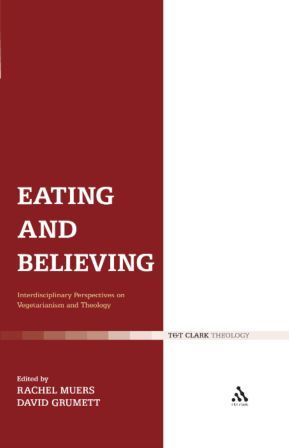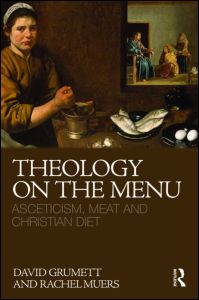

Theology on the Menu: Asceticism, Meat and Christian Diet
by David Grumett and Rachel Muers
London: Routledge, February 2010. ISBN 978-0-415-49683-4 (pb), 978-0-415-49682-7 (hb). x + 207 pp. $39.95/£21.99 (pb), $125/£75 (hb).
Food—what we eat, how much we eat, how it is produced and prepared, and its cultural and ecological significance—is an increasingly significant topic not only for scholars but for all of us. Theology on the Menu is the first systematic and historical assessment of Christian attitudes to food and its role in shaping Christian identity. David Grumett and Rachel Muers unfold a fascinating history of feasting and fasting, food regulations and resistance to regulation, the symbolism attached to particular foods, the relationship between diet and doctrine, and how food has shaped inter-religious encounters. Everyone interested in Christian approaches to food and diet or seeking to understand how theology can engage fruitfully with everyday life will find this book a stimulus and an inspiration.
'demonstrates a wide range of ways that food choices are of profound moral and religious significance' Norman Wirzba, Journal for the Study of Religion, Nature and Culture
'any reflective Christian who eats should be willing to find this book interesting' Neil Messer, Studies in Christian Ethics
'could serve as a useful tool for study and discussion among Christians' Barbara Timmermans, Christian Scholar's Review
'many theological libraries would benefit greatly from adding this book to their collection' Joshua R. Furnal, Reviews in Religion and Theology
'This book's varied and frank deliberations have much to offer any scholar interested in Christian uses of food, and more generally to theologians interested in discussions of practices.' Jana Marguerite Bennett, Modern Theology
'There is much in Theology on the Menu that will resonate with a practical theological audience. . . . The book is well-written and provides constant stimulation, puzzlement, even astonishment.' Stephen Pattison, Practical Theology
'It is enormously refreshing to encounter the nuanced and subtle approach of David Grumett and Rachel Muers in this thoughtful and readable volume. . . . The book is packed with details that reveal the breathtaking diversity of Christian attitudes to ascetical eating.' Margaret Atkins OSA, New Blackfriars
'A new generation of British theologians is taking the debate over diet to the highest levels of scholarly and moral reflection, and Grumett and Muers are leading the way. . . . This is now the book to read in seminary and college courses in moral theology, or simply to deepen your own practice of thoughtful eating.' Prof Stephen Webb, Wabash College
'In this outstanding book David Grumett and Rachel Muers offer us something quite original. Despite their own different moral positions on relevant issues, the authors have produced a seamless common text that is invariably informative about the complexities of Christian attitudes over the centuries, sometimes amusing but always challenging. Without doubt they have succeeded in putting food on the menu of important unresolved theological issues that merit further consideration.' Prof David Brown FBA, University of St Andrews
'Theology on the Menu is a rich exploration of the diversity and complexity of Christian attitudes toward meat, fasting, and broader dietary issues. Drawing on an eclectic range of historical and scriptural sources, Grumett and Muers have used food as a fruitful entry point for the study of lived religion. Theologians, historians, and anyone interested in religious foodways will find their work valuable and thought-provoking.' Prof Peter Harle, University of Minnesota
'In this sweeping study of the practice and interpretation of Christian dietary choice from antiquity to the contemporary period, Grumett and Muers illuminate the web of common impulses and deep ambiguities surrounding food abstinence, especially vegetarianism. The choice not to eat animal flesh, while associated in Christian tradition with sanctity, discipline, spiritual purity, and liturgical rhythms, also incites suspicion of heresy, pagan and Jewish sympathies, and non-communal elitism. The authors demonstrate through analysis of scripture, ritual, historical food practices and controversies, that the Christian menu signifies understandings of creation, animals and humans as created beings, sacrifice, and the place of the body in religious identity.' Prof Teresa Shaw, Claremont Graduate University
Chapter headings
1 Eating in the Wilderness: voices in the wilderness; the anchorite's diet and the anchorite's body; from gluttony to lust; cities in the sand
2 Food in the Ordered City: monastic moderation; beyond the monastery: the social fast; the public fast; the power of ascetic resistance
3 Secularizing Diet: spaces, times and bodies in Benedict's Rule; regulating and critiquing monastic feasting; mendicant flexibility; food, body and identity: scholastic debates
4 Fasting by Choice: reforming the fast; liberty and method; Christians and the birth of modern vegetarianism; Christian vegetarians and new food products; Christian vegetarianism: a revival?
5 Clean and Unclean Animals: the meaning of biblical classifications; the quadruped; blood and predation; Christian diet: Jerusalem and beyond; eating moral and spiritual animals; a structured gift
6 Community, Orthodoxy and Heresy: Augustine's Manichean shadow; regulating orthodox diet: rules, councils and inquisitions; Christians, Jews and their food; Christians, Muslims and their food; heresy and counterculture
7 Sacrifice and Slaughter: early Christianity: beyond sacrifice?; Christians rituals of animal sacrifice; bloody eating; sacrifice and the Cross; sacrifice and the slaughterhouse
8 Christian Food, Heavenly Food, Worldly Food: present-day food choices; Christian cuisines: what is food?; idolatrous consumption; the goodness of creation and unnatural foods; eating towards Eden; foods of fear and foods of hope
9 Concluding Reflections: Practices, Everyday Life and Theological Tradition: explaining embodied practices; generative puzzles; which practices matter?: sharing a table; recipes for tradition
Details on publisher's website

Eating and Believing: Interdisciplinary Perspectives on Vegetarianism and Theology
edited by Rachel Muers and David Grumett
New York and London: T&T Clark, January 2012 (pb), October 2008 (hb). ISBN 978-0-567-26795-5 (pb), 978-0-567-03284-3 (hb). viii+274 pp. $49.95/£29.99 (pb), $130/£65 (hb).
What are the links between people’s beliefs and the foods they choose to eat? In the modern Western world, dietary choices are a topic of ethical and political debate, but how can centuries of Christian thought and practice also inform them? And how do reasons for abstaining from particular foods in the modern world compare with earlier ones? This collection will shed new light on modern vegetarianism and related forms of dietary choice by situating them in the context of historic Christian practice. It will show how the theological significance of embodied practice may be retrieved and reconceived in the present day.
Food and diet is a neglected area of Christian theology, and Christianity is conspicuous among the modern world’s religions in having few dietary rules or customs. Yet historically, food and the practices surrounding it have significantly shaped Christian lives and identities. This collection, prepared collaboratively, includes contributions on the relationship between Christian beliefs and food practices in specific historical contexts. It considers the relationship between eating and believing from non-Christian perspectives that have in turn shaped Christian attitudes and practices. It also examines ethical arguments about vegetarianism and their significance for emerging Christian theologies of food.
'Progress on the topic of theology, animals, and diet has stalled in recent years, but this collection of essays should get it going again. A
new generation of primarily English scholars is bringing a renewed sophistication to these conversations, and Muers and Grumett should be congratulated for
gathering in one volume some of the best of this recent work. . . . David Grumett’s analysis of Irish Christianity is especially illuminating. Anyone interested in the crucial but hidden role that the dietary
restrictions of the Jerusalem Council played in Christian history, as well as the perplexing ongoing influence of the Noachide laws, should
read this essay.' Stephen H. Webb, Reviews in Religion and Theology
'A fascinating series of essays that explores the implications of the complex and sometimes unexpected history of food rules and practices in the Christian and related traditions. Eating and Believing shows how the diverse range of beliefs and practices with which vegetarianism has been associated have been used to underwrite community, mark the boundaries between the animal and the human, and express solidarity. One of the great strengths of this book is the diverse range of scholarship it draws on: classical, biblical, sociological, philosophical, theological. It engages creatively with the idea of food as a form of practical theology, a way of thinking about the world at a concrete day-to-day level, as well as an expressive act.' Julia M. Twigg, Professor of Social Policy and Sociology, University of Kent, UK
Details on publisher's website